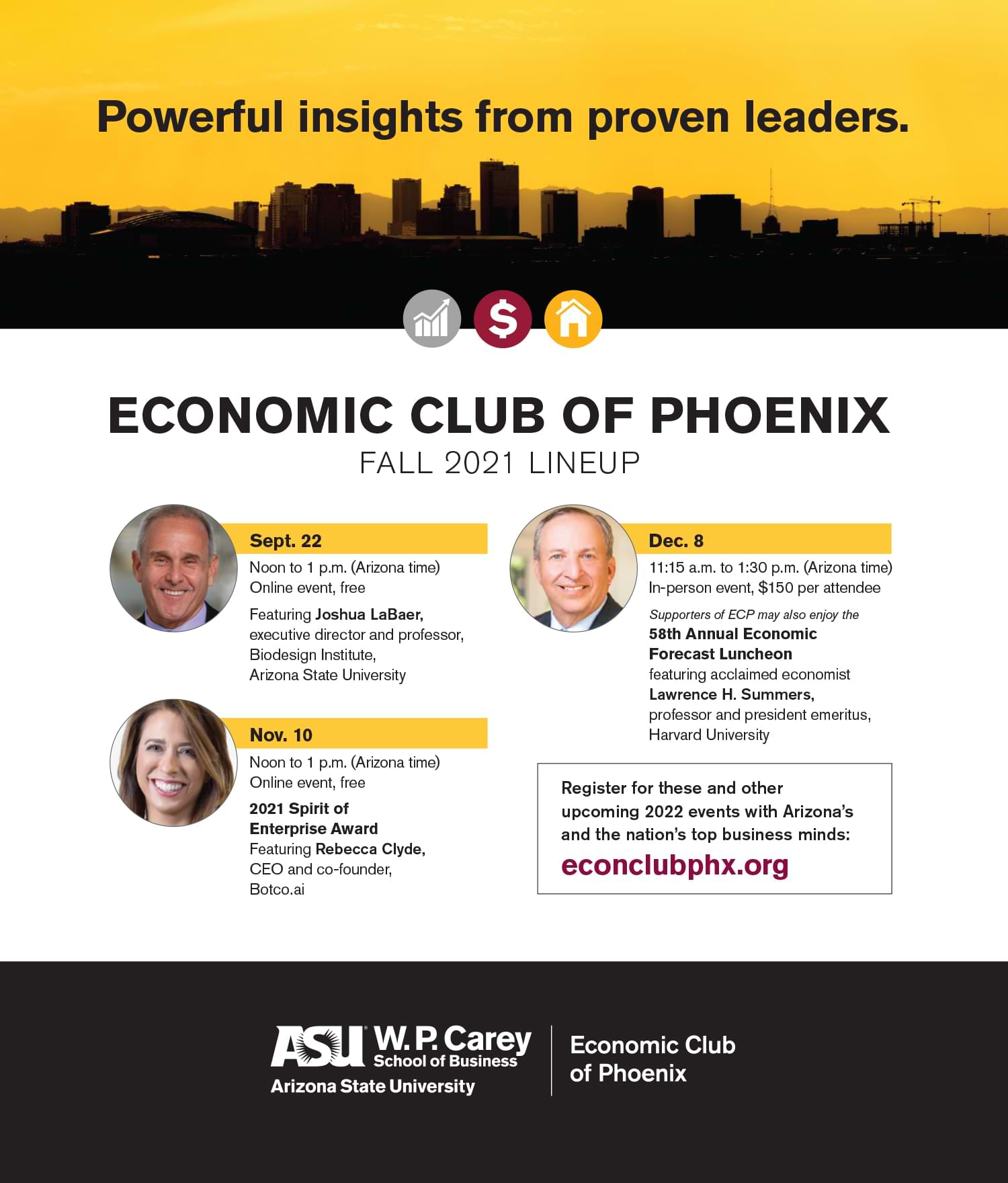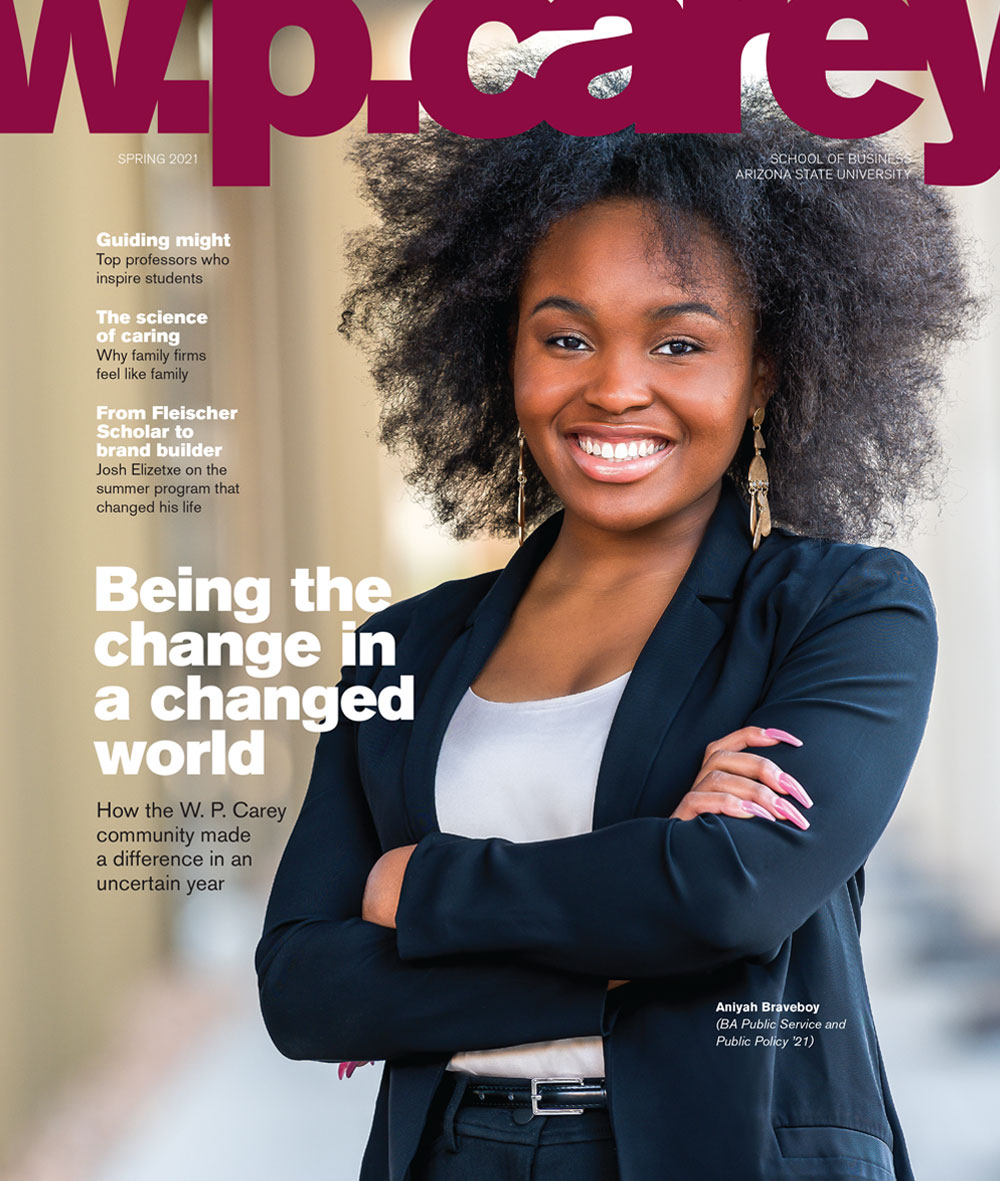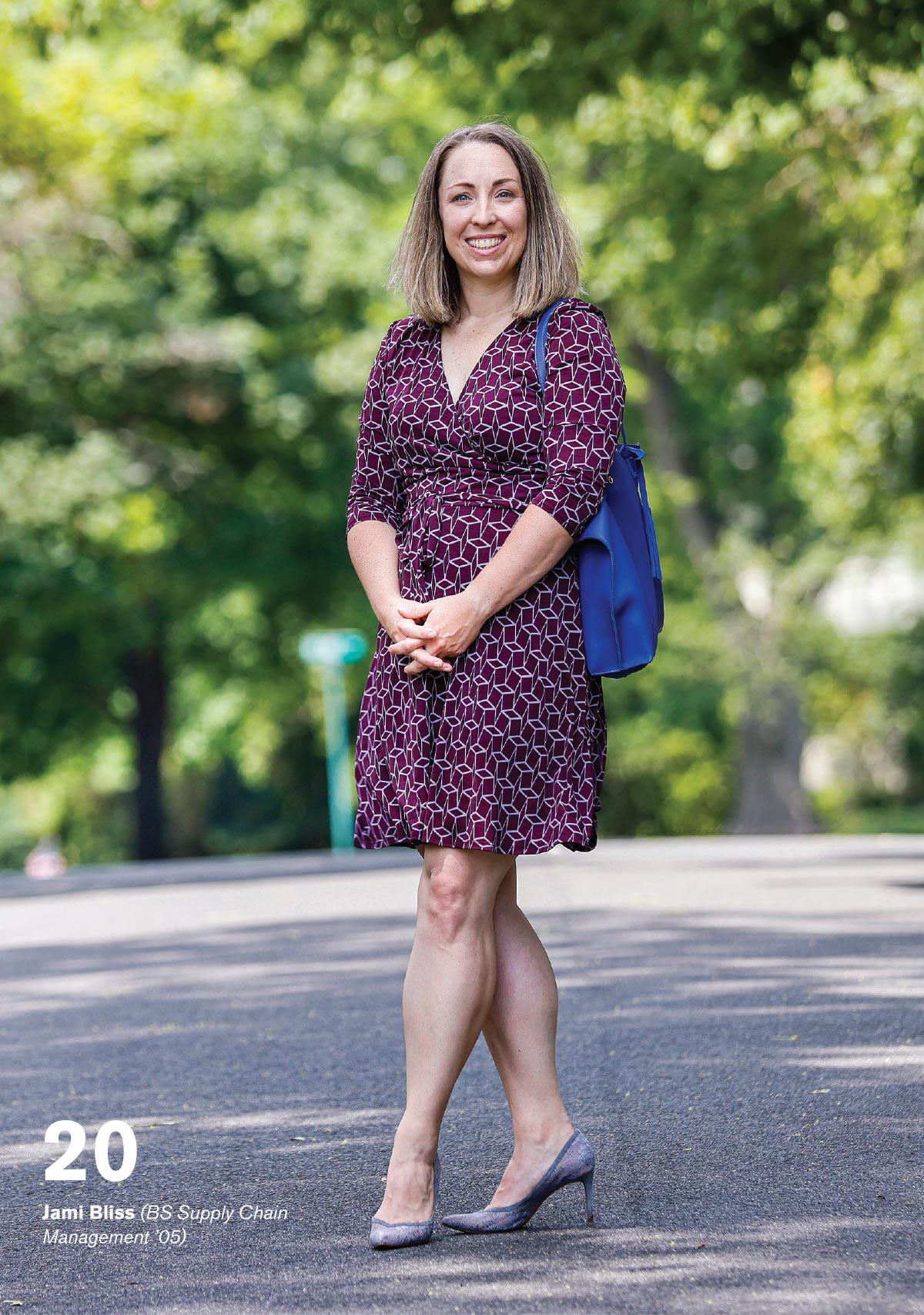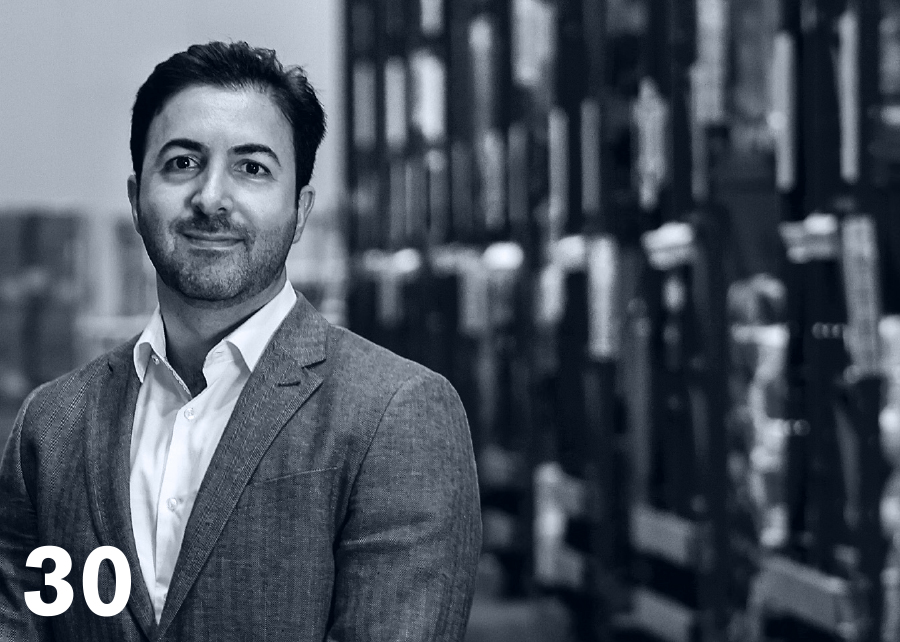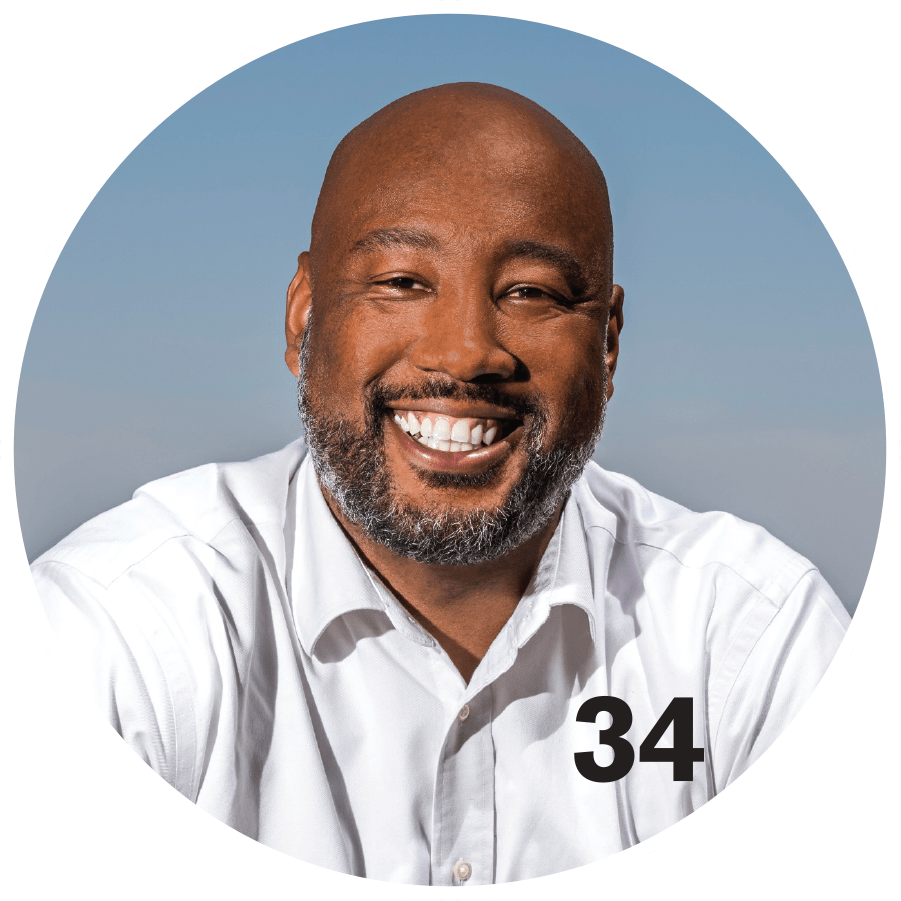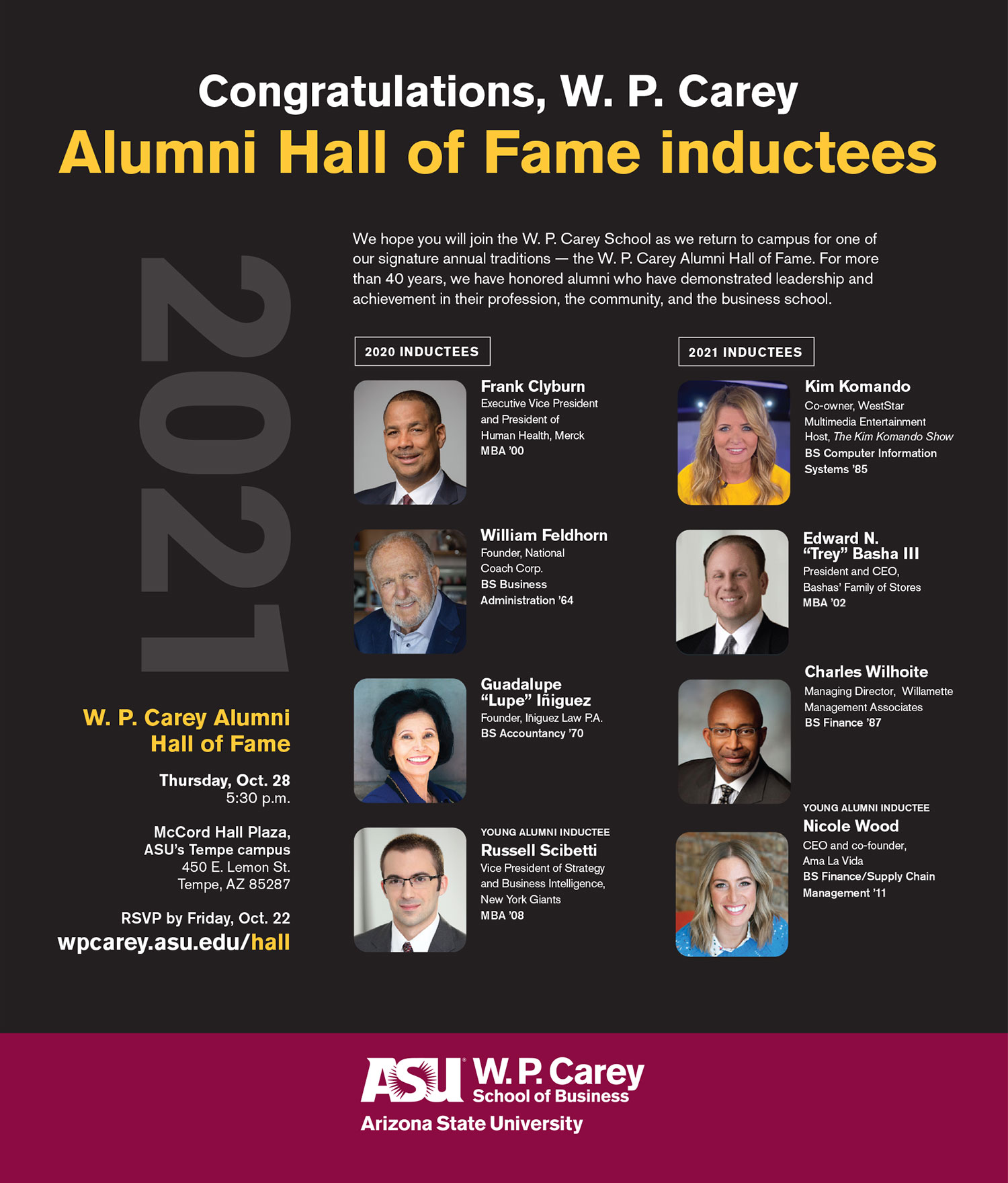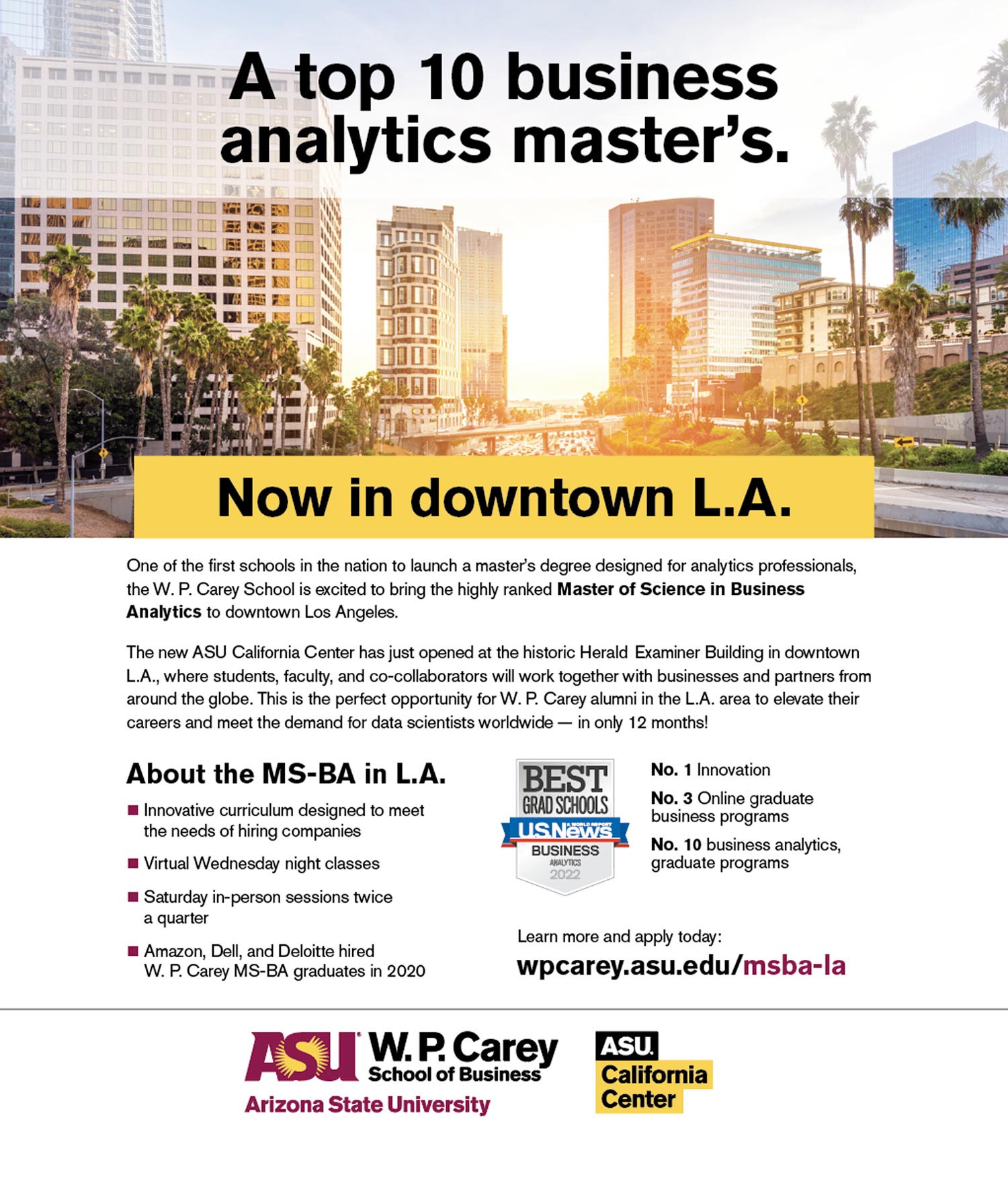

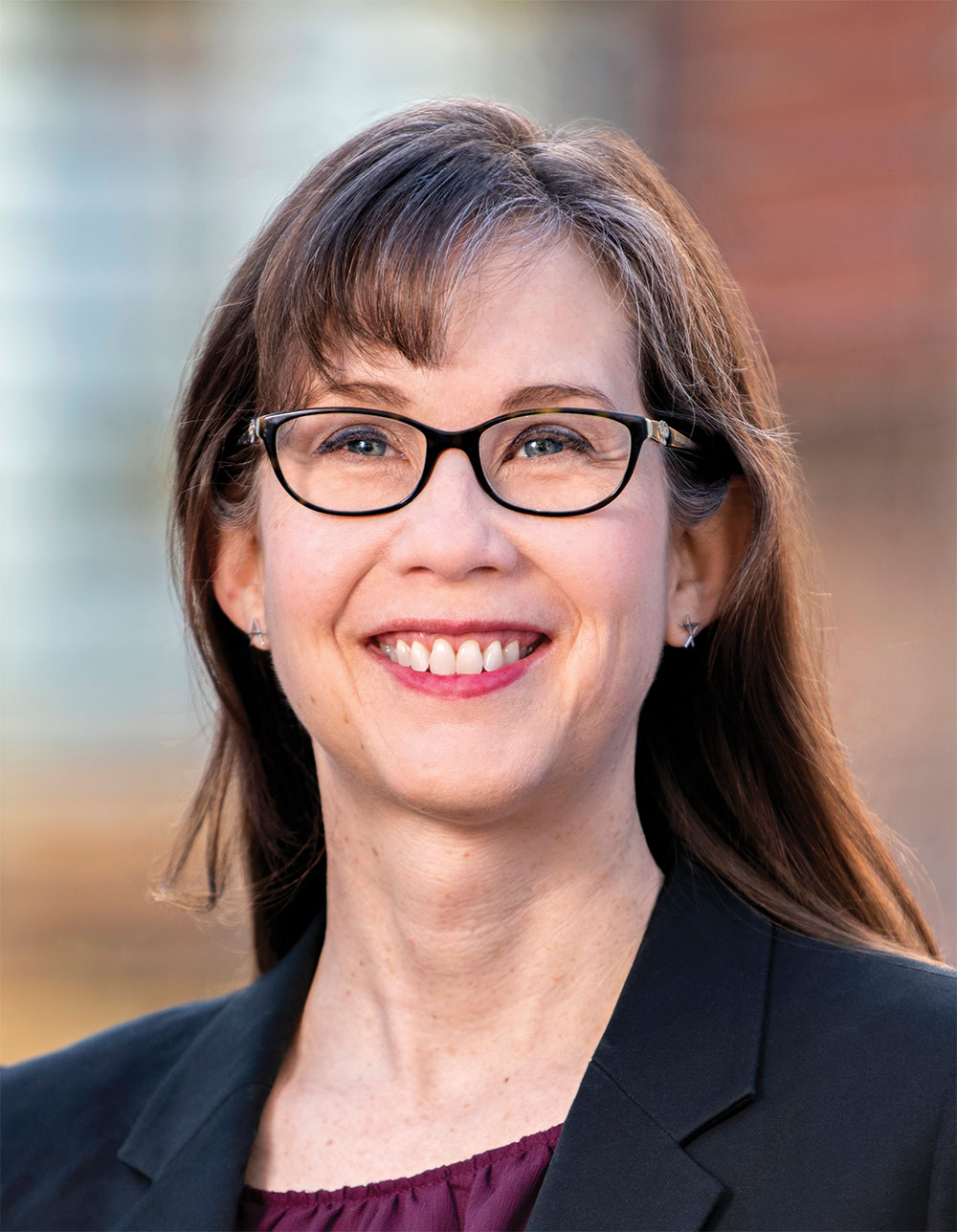
t W. P. Carey, we’re settling back into a new normal:
Students and faculty are back on campus, we can host in-person events (see you at Homecoming on Oct. 30), and student clubs are in full swing. We aren’t ignoring what we learned the past year. Students have more flexibility for when and where they access services, and working virtually has shown us different ways to connect and engage.
Our research also reflects learnings and nowhere is that more evident than in our Department of Supply Chain Management. Did you know how profoundly the supply chain — processes to produce and distribute goods — affects our lives? COVID-19 brought the importance of the discipline into sharp relief as we experienced shortages of food, toilet paper, medical supplies, and more.
It’s the perfect time for us to spotlight our supply chain program, which is consistently Top 3 in the U.S. News & World Report rankings for undergraduate and graduate programs in the country. In this issue, read about W. P. Carey professors studying effective supply chain practices in humanitarian disasters and increasing supply chain resiliency. We also hear from alums who are using what they learned at W. P. Carey in their supply chain roles across the world.
We hope this issue gives you new insights into the supply chain, and ways the W. P. Carey community is setting standards for the entire field.
Warm regards,
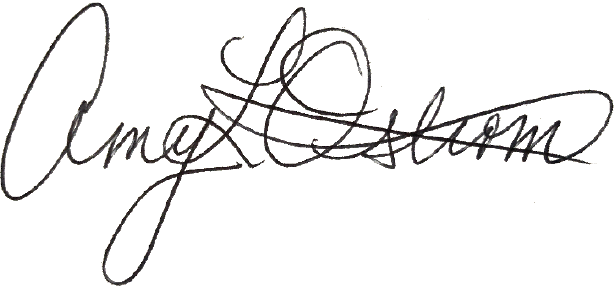
Interim Dean
PetSmart Chair in Services Leadership
W. P. Carey School of Business
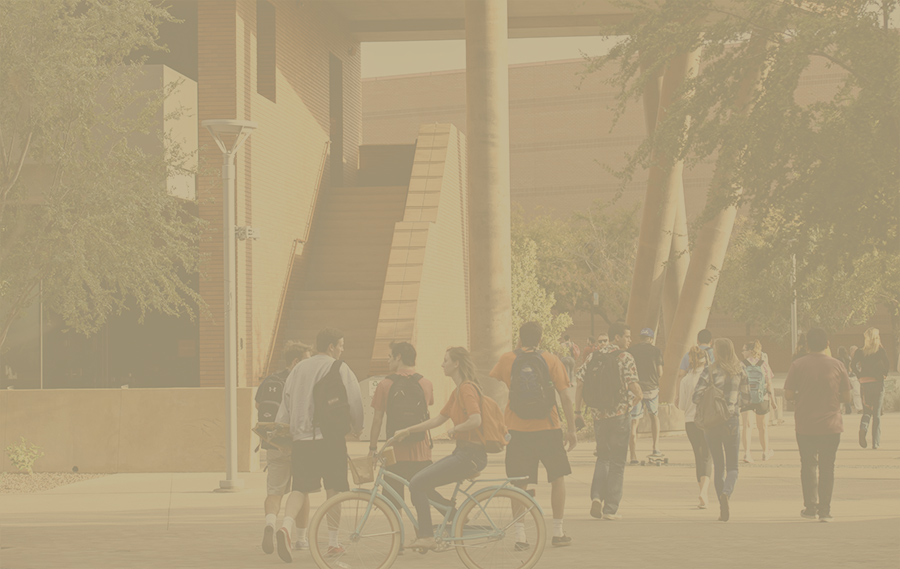

t W. P. Carey, we’re settling back into a new normal:
Students and faculty are back on campus, we can host in-person events (see you at Homecoming on Oct. 30), and student clubs are in full swing. We aren’t ignoring what we learned the past year. Students have more flexibility for when and where they access services, and working virtually has shown us different ways to connect and engage.
Our research also reflects learnings and nowhere is that more evident than in our Department of Supply Chain Management. Did you know how profoundly the supply chain — processes to produce and distribute goods — affects our lives? COVID-19 brought the importance of the discipline into sharp relief as we experienced shortages of food, toilet paper, medical supplies, and more.
It’s the perfect time for us to spotlight our supply chain program, which is consistently Top 3 in the U.S. News & World Report rankings for undergraduate and graduate programs in the country. In this issue, read about W. P. Carey professors studying effective supply chain practices in humanitarian disasters and increasing supply chain resiliency. We also hear from alums who are using what they learned at W. P. Carey in their supply chain roles across the world.
We hope this issue gives you new insights into the supply chain, and ways the W. P. Carey community is setting standards for the entire field.
Warm regards,

Interim Dean
PetSmart Chair in Services Leadership
W. P. Carey School of Business
I’ve always known the name Calvin C. Goode but didn’t know the man himself. Read his bio in W. P. Carey’s alumni magazine and learned just how impressive a man he was. Thank you! We need to see more about good things and good people in our current day-to-day lives.
Margie Lopez (MBA ’99)
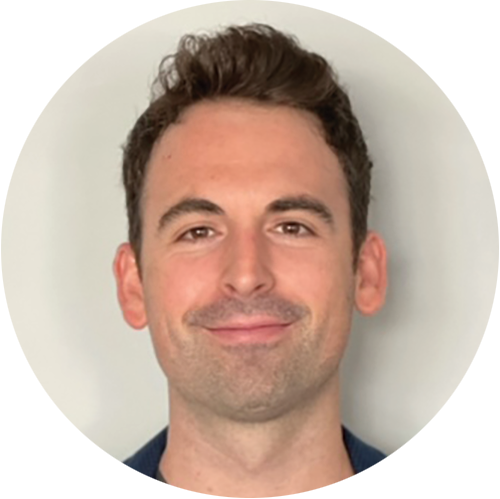
 Aaron Friedman (BA Sustainability/BS Supply Chain Management ’11)
Aaron Friedman (BA Sustainability/BS Supply Chain Management ’11)
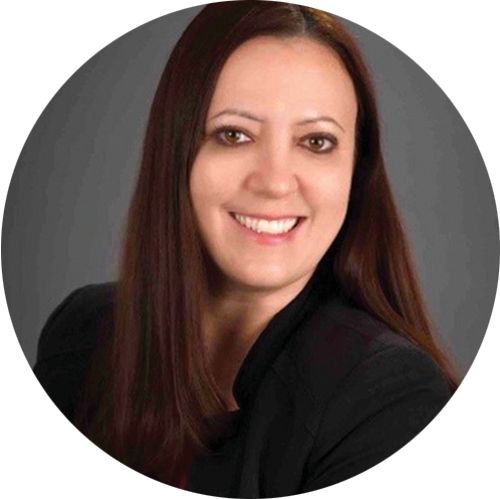
 Katie Ridley Carpenter (MBA ’12)
Katie Ridley Carpenter (MBA ’12)
 Neha Singh (MBA/MS-BA ’17)
Neha Singh (MBA/MS-BA ’17)
 Manish Choudhary (MBA ’19)
Manish Choudhary (MBA ’19)
Volume 9, Issue 1, Autumn 2021
Amy L. Ostrom, PhD
Interim Dean, PetSmart Chair
in Services Leadership
Colin Boyd
Executive Director, Marketing
and Communications
Michael Remedi
Associate Dean and Executive
Director of Development
Brennan Forss
Director of Alumni Relations
Theresa Shaw
Manager of Alumni Relations
W. P. Carey Alumni
wpcarey.asu.edu/alumni
Facebook
facebook.com/wpcareyschool
LinkedIn
wpcarey.asu.edu/linkedin
Twitter
@WPCareySchool
Shay Moser
Senior Creative Director
Paula Murray
Staff Contributors
Emily Beach, Perri Collins, Sean Durell, Hunter McCormick, Tiana Morgan, Hannah O’Regan, Madeline Sargent
Contributors
Kim Catley, Melissa Crytzer Fry, Sally Clasen, Jane Larson, Betsy Loeff, Teresa Meek, Erin Peterson, David Schwartz, Jenn Woolson
Photographers
W. Scott Mitchell, Michael Paras, Shelley Valdez
Managing Editor
W. P. Carey School of Business
Arizona State University
PO Box 872506
Tempe, AZ 85287-2506
Changes of address and other subscription inquiries can be emailed to:
editor.wpcmagazine@asu.edu
W. P. Carey magazine is a publication of the W. P. Carey School of Business at Arizona State University © 2021
Send editorial submissions and letters to:
editor.wpcmagazine@asu.edu
fter graduating from ASU’s W. P. Carey School of Business, Jennifer Boonlorn (BS Marketing ’01) went on to Parsons School of Design in New York City, where she lived, worked, and studied fashion for four years before moving back to Arizona.
Her parents died in a car crash just before her graduation from W. P. Carey. “Right before the accident, my mom turned around and asked me where I wanted to go. We were talking about going on vacation. That’s the last question she asked me,” Boonlorn says.
The devastating loss of her parents propelled Boonlorn to reflect on her purpose and decide what her next steps would be. “Even though my parents wanted me to pursue law, I knew fashion and design were my passions. I immediately knew I had to shift directions,” she reflects.
Despite the hardship she was facing in her personal life, she began her journey as a frequent W. P. Carey donor just a couple years after graduation. “It’s essential for me to honor my parents and their love of learning. My goal is to help students experience the same opportunities I’ve had.”
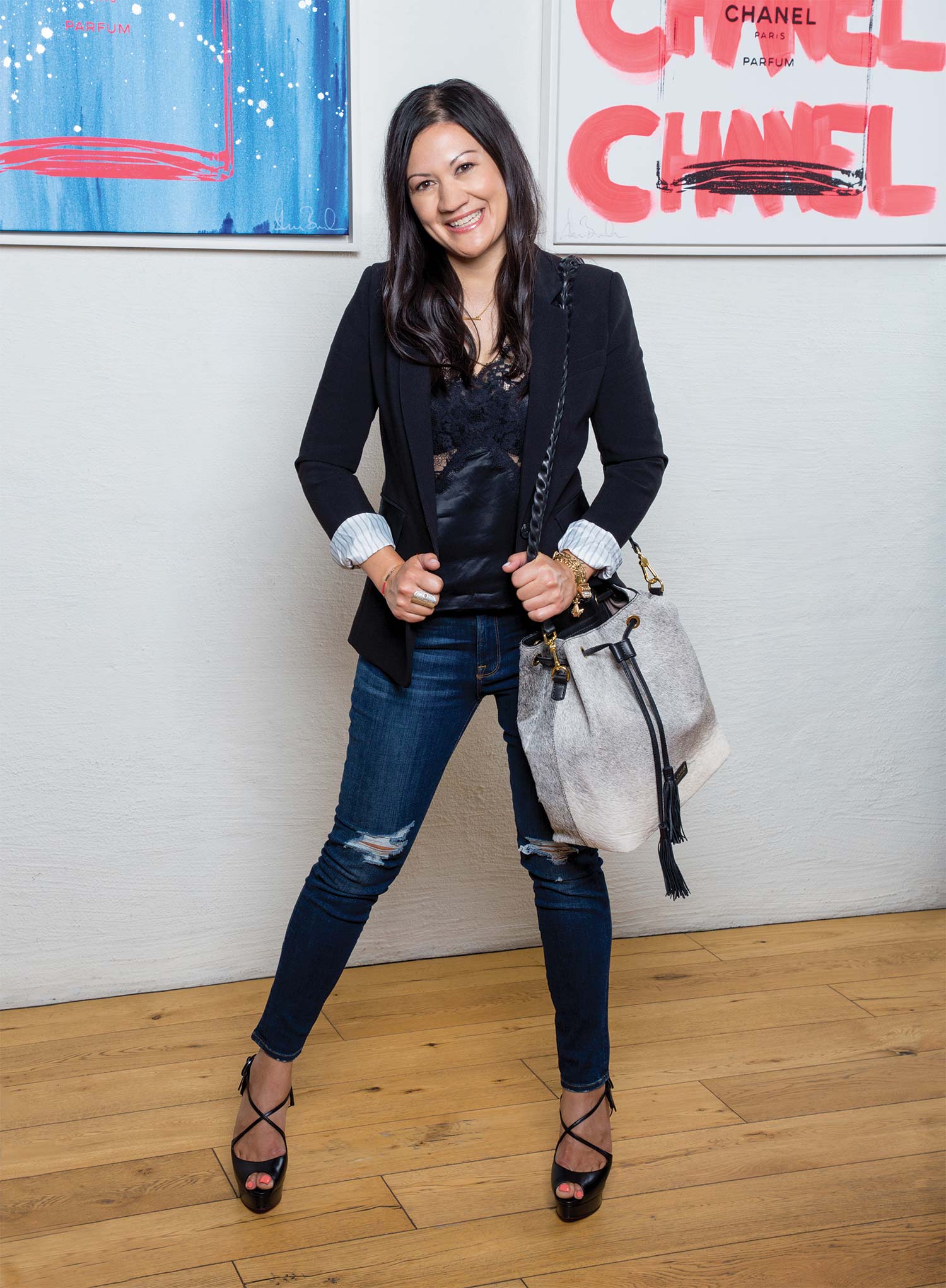
fter graduating from ASU’s W. P. Carey School of Business, Jennifer Boonlorn (BS Marketing ’01) went on to Parsons School of Design in New York City, where she lived, worked, and studied fashion for four years before moving back to Arizona.
Her parents died in a car crash just before her graduation from W. P. Carey. “Right before the accident, my mom turned around and asked me where I wanted to go. We were talking about going on vacation. That’s the last question she asked me,” Boonlorn says.
The devastating loss of her parents propelled Boonlorn to reflect on her purpose and decide what her next steps would be. “Even though my parents wanted me to pursue law, I knew fashion and design were my passions. I immediately knew I had to shift directions,” she reflects.
Despite the hardship she was facing in her personal life, she began her journey as a frequent W. P. Carey donor just a couple years after graduation. “It’s essential for me to honor my parents and their love of learning. My goal is to help students experience the same opportunities I’ve had.”
ALL THINGS WPC
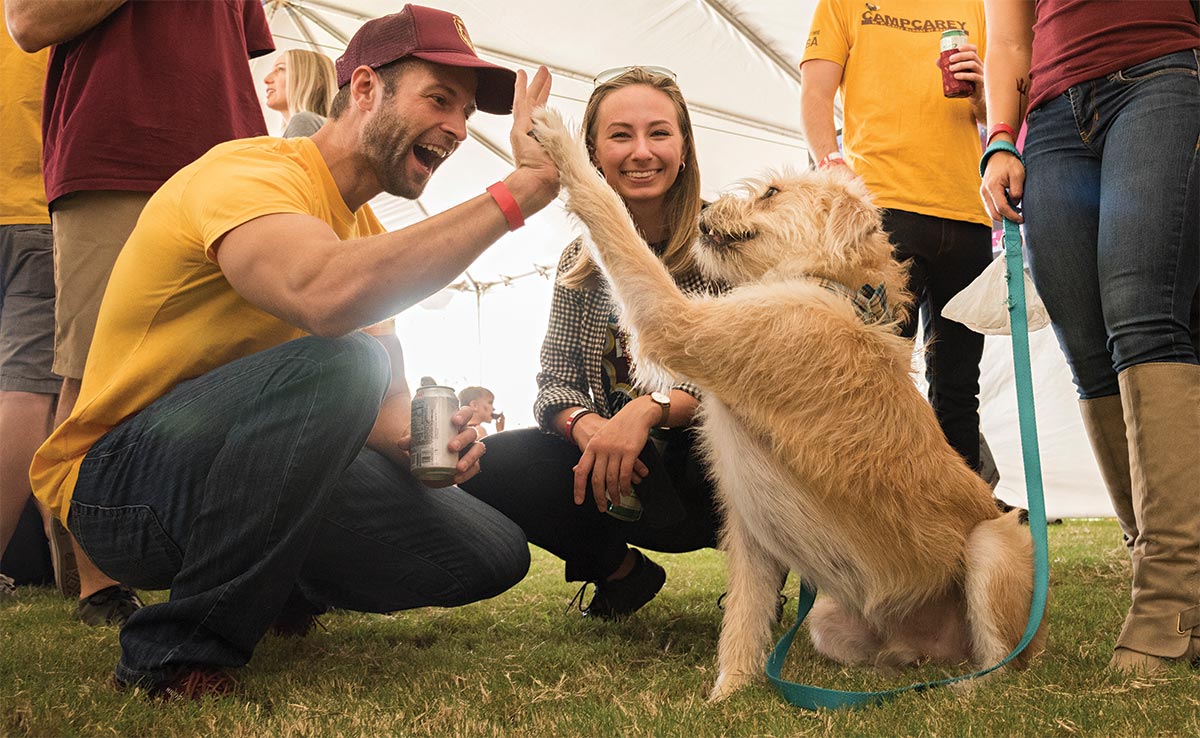
ngage with, experience the impact of, and expect to be inspired by your W. P. Carey community through annual alumni events and programming — hosted online, on campus, and by peers in your hometown. Events offered throughout the year include:
- Learning events such as Back to Class, led by W. P. Carey faculty
- Workshops hosted by W. P. Carey Career Management
- Volunteer and service opportunities
- Local mixers and reunions
“Attending alumni events is a great way to stay involved in the community, network, and be exposed to current business topics,” says Dave Yorita (MBA ’84). “I believe knowledge is crucial, and I appreciate the information being shared at alumni events.”
Look for the return of our signature in-person events, including Homecoming festivities, Hall of Fame, and certain Economic Club of Phoenix events starting this fall.
For the latest dates and details, and to register, be sure to visit wpcarey.asu.edu/alumni-events.




8

ALL THINGS WPC
eth Crawford (MS Agribusiness ’97), senior vice president of AGCO Corp., looks back at his time at W. P. Carey with appreciation and remembers how the school gave him the chance to succeed. “When I applied as a farm kid from rural Minnesota, I had no idea of the world-class education awaiting me,” he says.
Today, Crawford is doing all he can to give back. He is involved in the W. P. Carey Alumni Council, has reviewed scholarship applications, provided input to business school leadership, met and mentored current students, and built relationships with fellow alumni.
Giving to W. P. Carey goes deeper than money
Through his experience being a mentor, Crawford has discovered the value of helping the next generation of business leaders. “One of the students I mentored received her undergraduate and graduate degrees without ever stepping foot on the Tempe campus,” he says. “That alone made me inspired to see her success.”
Crawford quickly realized how much virtual learning differed from his in-person experience at W. P. Carey. “When I was in college, we didn’t even have the internet,” he says. “It’s hard to imagine going to college without living in a dorm, or walking across the bridge to campus. She was able to complete her degrees independently.”
ALL THINGS WPC
ntrepreneur and W. P. Carey mentor Lendrick Robinson (MS-FIN ’16) believes we all stand on the shoulders of giants. “I wouldn’t be the person I am today without the mentors I’ve had in my life.”
From a young age, Robinson was interested in finance. Throughout his life, he’s had mentors who have gifted him with investing books. “Some people may think that type of gift is strange, but to me it was perfect — finance has always been fascinating to me. Taking that extra step of thoughtfulness meant everything,” he says.
The successful entrepreneur and mentor has leveraged those early insights in finance. He directly invests in real estate and plans to acquire additional property as a long-term plan to protect against inflation.
Robinson strives to make his tenants happy. “If you treat people with respect, good things will come. Sometimes, it’s not all about the monetary benefits — it’s about handling situations with emotional intelligence. To me, business truly is personal.”
The lifelong connection Robinson has with the school and fellow W. P. Carey alumni is something he’ll always value. “It means a tremendous amount to me, and I want to contribute because I want our reputation to grow,” he says.
What’s new in your life and career? Share the latest with your community: wpcarey.asu.edu/class-notes
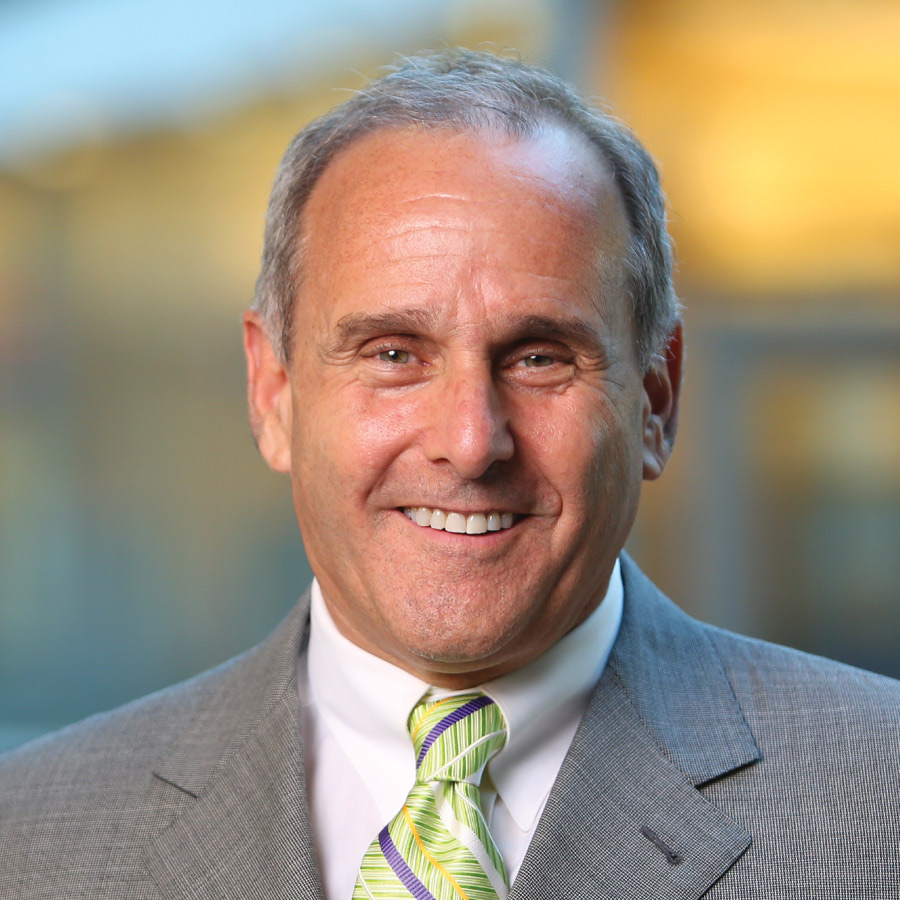
from proven business leaders
Events
The Biodesign Institute developed diagnostic testing under FDA emergency use authorization, becoming the first in the U.S. to offer and run public saliva tests for coronavirus. For his work, LaBaer was named Innovator of the Year – Academia at the Arizona Governor’s Celebration of Innovation Awards. LaBaer also received the Jon W. McGarity Arizona Bioscience Leader of the Year Award from AZBio. We are excited to welcome LaBaer to kick off this ECP season.
Join us all season long for powerful insights from proven business leaders: wpcarey.asu.edu/ecp
ALL THINGS WPC
ast winter, 40 students and researchers from across the world came together virtually to learn new skills in research methods and survey design through W. P. Carey’s Food and Agribusiness Lab. The Winter School — a partnership between researchers at ASU, Cornell University, Michigan State University, Purdue University, and Susquehanna University — was a one-week, intensive introduction to design surveys and experimental methods held in January.
More specifically, the program serves as an introduction to state-of-the-art methods to address marketing research questions related to preferences, willingness to pay, and choice. For example, participants can explore market research questions that deduce which product features a customer is willing to pay extra for.
Carola Grebitus, associate professor of food industry management in the Morrison School of Agribusiness at W. P. Carey and director of the Winter School, explained how these skills are applicable across a variety of disciplines and industries, such as marketing, research, technology, and public health. “If you work in any role where you are designing or analyzing customer preferences, these are skills you can use,” she says. “For example, small-business owners who want to understand what drives their success learn how to develop a survey instrument to get customer feedback.”
Future sessions of Winter School will alternate between ASU and Michigan State University, with virtual options available. Interested alumni are encouraged to attend!
Visit research.wpcarey.asu.edu/fab-lab to learn more.
ALL THINGS WPC

Learning Opportunities
ALL THINGS WPC
id you know business alumni enjoy lifelong access to W. P. Carey career resources, events, connections, and opportunities? Yes, really! W. P. Carey Career Management and Employer Engagement (CMEE) connects and enhances the lifelong professional development and recruitment journeys of students, alumni, and employers alike. We are pleased to introduce you to CMEE and highlight some of their new offerings. Head over to career.wpcarey.asu.edu to learn more or connect with the team directly.
The school has taken a fresh approach to every aspect of career development for W. P. Carey students and alumni. Why? Because resumes and interviews are small parts of a lifelong career management journey — and to teach this lesson, we needed to reboot our curriculum.
“Old-school career management was about helping students with their resume, cover letter, and interview,” says Sharon Irwin-Foulon, executive director of W. P. Carey Career Management and Employer Engagement. “It was very transactional.”
The business school’s new program is designed to follow students through their academic journeys in a more efficient and focused way. “The goal is to ensure they are confident and capable of reaching out to the market at the right time and to differentiate themselves for all the right reasons,” she explains.
- Connect with other W. P. Carey Sun Devils
- Promote your alumni-owned company and grow your brand
- Share or discover job opportunities and career tips from career experts
- Participate in W. P. Carey polls
- Hear about special events just for alumni

hen you were deciding where to get your degree, you might have looked at different program rankings as one measure to consider. But now that you have your W. P. Carey degree, do rankings still impact you? You might be surprised to learn they remain a big deal! For example, when you are on the job market, the value of your W. P. Carey degree increases with the school’s continued ascent in the rankings. Good rankings are a win-win.
You will be happy to hear that W. P. Carey has 30 programs and disciplines ranked in the Top 25 by U.S. News & World Report. That’s the most of any business school in the country! Internationally, we have also continued to climb. The Financial Times ranked our Online MBA No. 15 in the world, and the Center for World University Rankings names us No. 9 for Business.
Some of these ranking publications ask for alumni input through surveys, so keep an eye out for those. And remember, we have great options for you to continue investing in yourself through education.
Related reading:
- Rankings at a glance: wpcarey.asu.edu/rankings
- Online W. P. Carey degrees: wpcarey.asu.edu/online-programs

reated in 2013, the W. P. Carey Master of Science in Business Analytics (MS-BA) has attracted thousands of students from across the country and around the world due to its market-driven curriculum and excellent reputation.
Because of the success of the demand for the MS-BA, W. P. Carey has launched the program in Los Angeles, with classes starting in August 2022. The program’s new home is in ASU’s California Center in the historic Los Angeles Herald Examiner Building. The building was commissioned by William Randolph Hearst and completed in 1914, and will house a number of ASU schools, as well as collaboration and event space. Next fall, the school will also launch the master’s degree in accountancy and data analytics in Los Angeles; more details will be coming soon.
“As we expand the program to offer a solution for students in Southern California that is not only closer to home but also designed to accommodate the busy schedules of working professionals, we’re extremely proud of what the MS-BA has achieved so far and excited about its future in downtown L.A.,” says Amy Ostrom , interim dean of the W. P. Carey School of Business and the PetSmart Chair in Services Leadership.
The 12-month MS-BA in L.A. is delivered on a flexible weekly schedule. Students take classes on Wednesdays from 6 to 10 p.m. (Pacific time) via ASU Sync, a fully interactive remote learning modality that includes live lectures via Zoom.
Every quarter, classes will also meet in person at the ASU California Center on two consecutive Saturdays from 8 a.m. to 5 p.m. (in August, October, January, March, and June). Students will have the freedom to complete coursework independently, while also building essential collaboration and communication skills, through a combination of virtual and in-person learning.
According to the Bureau of Labor Statistics, demand for data scientists is expected to grow 15% by the end of the decade, much faster than the average for all occupations. MS-BA students in Los Angeles can capitalize on this demand and, with additional support from W. P. Carey Career Management and Employer Engagement, connect with hiring firms in California and nationwide to elevate their careers. Visit wpcarey.asu.edu/msba-la to learn more.
ALL THINGS WPC

n $8 million grant from the U.S. Department of Labor (DOL) can help provide the skills necessary to fill the 6.4 million job openings reported in the United States.
At W. P. Carey, the One Workforce grant will prepare students to capitalize on demand for high-paying jobs in the advanced manufacturing, cybersecurity, data analytics, and information technology fields. Also known as AZNext, the Arizona Workforce Training Accelerator Partnership for Next Generation Jobs program, aims to train at least 2,000 participants for permanent job placement during the next four years.
W. P. Carey collaborated with the Ira A. Fulton Schools of Engineering, the New College of Interdisciplinary Arts and Sciences, and several external partners for the grant, including the Arizona Commerce Authority, the Arizona Technology Council, Arizona@Work, and Pipeline AZ.
t the end of every semester, outstanding business graduates across disciplines join the W. P. Carey alumni community. Welcome to the next stage of your Sun Devil journey, Class of 2021! Here are three ways to ensure you’re fully benefiting from the advantages of your alma mater. Hint: These tips apply to all W. P. Carey graduates.
Keep current contact info (including a personal email address) on file to ensure you receive our alumni communications, including email newsletters and event announcements. You can opt out at any time, and we also welcome your feedback regarding the content you receive from us.
Participate in short alumni surveys that make a big impact on when, where, and how we engage. We seek alumni feedback from all graduating classes and locations and refresh our surveys periodically.
As we collect and learn from more alumni surveys, we will highlight even better programs and opportunities for engagement on your alumni homepage. Take a look once a quarter to see what’s new! From career resources and learning events to alumni stories and awards, there’s plenty to do and explore.
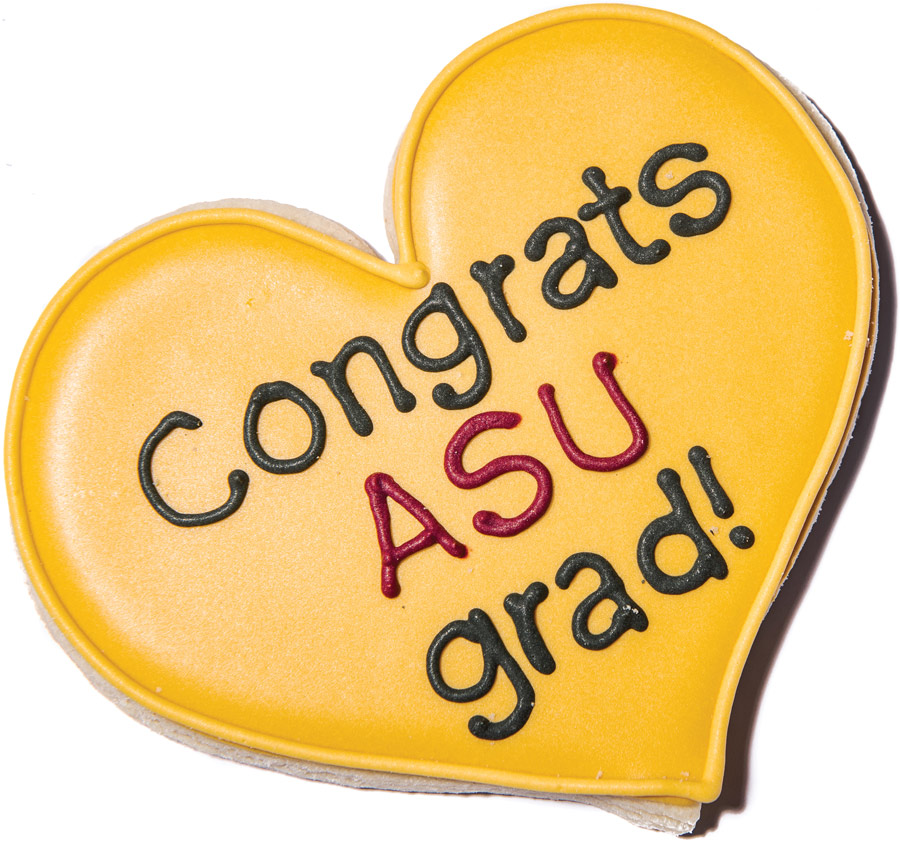


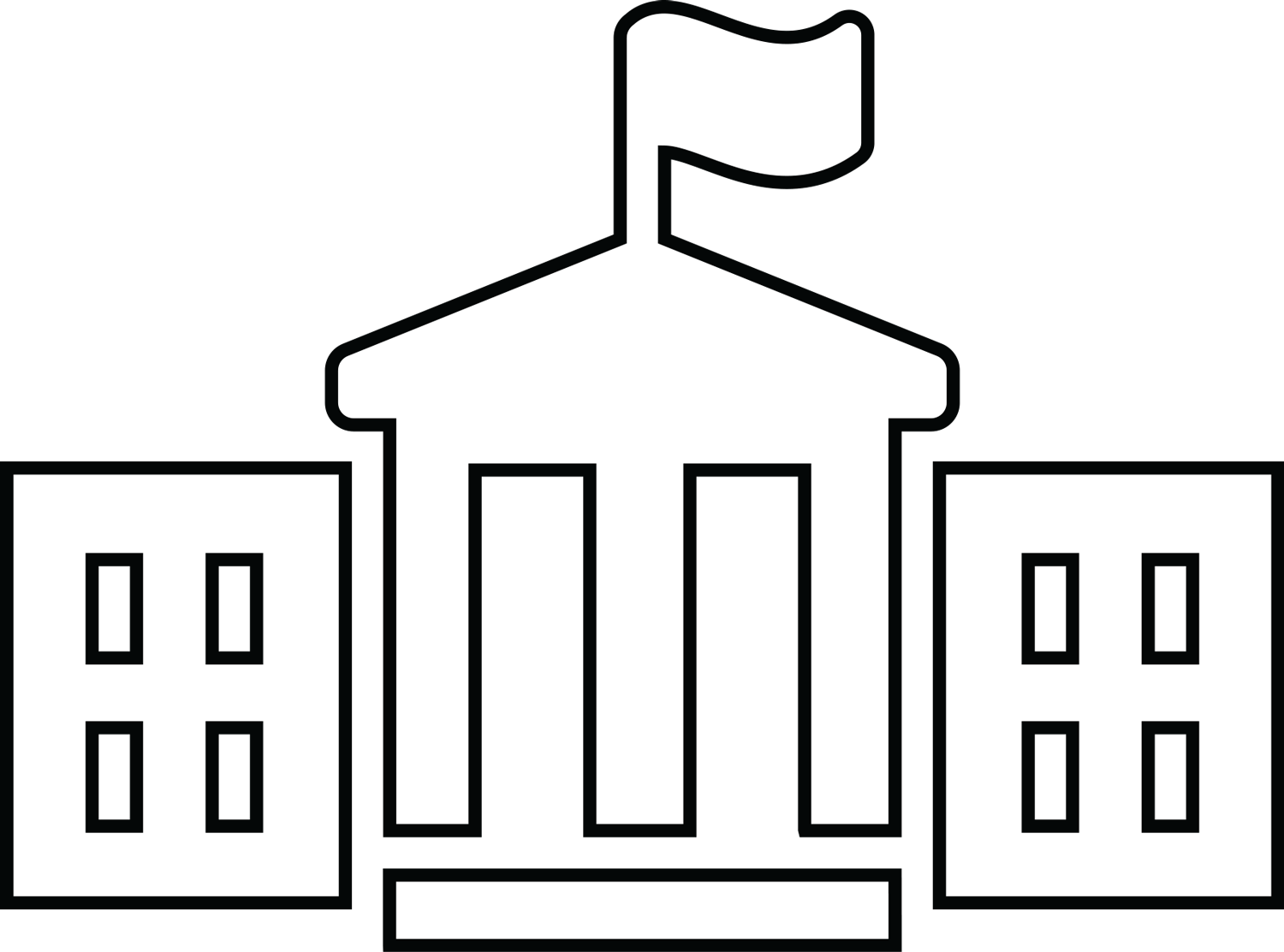


(BS Marketing ’92)
o you remember life before the word pandemic? Before dogs barking were common business-call sound effects? Before the phrase “you’re on mute” was heard in just about every meeting? Do you miss those days? Chances are, they’re not coming back.
What will “going to work” mean in the postpandemic age? W. P. Carey School alumni and professors weigh in on what’s ahead and what business leaders should know about managing remotely.
For organizations that sent workers home when shutdowns began and are just starting to bring people back into the office full or part time, Rick Bowers (BS Marketing ’92) says it’s time to take stock of both the work at hand and the people who do it. Bowers — president of TTI Success Insights, a company that helps other organizations maximize human potential through employee assessments and related consulting — recommended a process he calls “reboarding.”
“Reboarding is the act of reconnecting and reengaging your employees to make sure that people haven’t changed because of this significant emotional event we’ve all lived through this past year,” he explains. “It’s making sure the job a person was in before the pandemic is still the same job and making sure the person is still the same person.”

n mid-March 2020, just as COVID-19 stay-at-home orders began taking effect in the United States, toilet paper began to disappear. Media reports showed images of decimated supermarket shelves. People alerted friends and family members when they discovered a store with stock. Retailers implemented purchase limits.
In some ways, the panic-buying was similar to consumer purchasing behaviors ahead of hurricanes and winter storms. History has shown that when we might be stuck at home, toilet paper is one of the items we don’t want to be without.
This particular case, however, was different. As people began hoarding at unprecedented rates, retailers — who typically keep just a few weeks of supplies in warehouses, based on years of consistent data — quickly depleted their stock. Manufacturers also had to shift their balance of production, which is typically split between packages of softer, smaller rolls intended for home use and large rolls of thin, single-ply paper used in public restrooms (see Toilet paper tipping point on p. 13).
n a McKinsey survey, 93% of supply chain executives reported they’ll take steps to make their supply chains more resilient — the buzzword of the moment.
A supply chain is considered resilient to the degree that it provides the buying company operational continuity while facing disruption risk, according to Professor of Supply Chain Management Kevin Dooley. In his paper, “A Typology of Supply Network Resilience Strategies: Complex Collaborations in a Complex World,” he shares the three types of supply network resiliency.
Micro-level supply chain collaborations involve individual companies within a proprietary supply chain. The partners can act quickly should a risk occur and threaten supply, but their scope of control and influence is limited without other companies. This type of supply chain resilience is effective when the disruption is limited.
Macro-level supply chain collaborations bring institutional organizations like trade associations or government agencies and initiatives together, working among a range of organizations within and across industry sectors. These collaborations often create standards and norms that help organizations in the industry avoid risks.
Meso-level supply chain collaborations connect multiple supply networks to address short- to medium-term supply risks. These tend to be more opportunistic and ad hoc than micro- or macro-level collaborations.
According to Dooley — the chief scientist for The Sustainability Consortium, a global nonprofit transforming the consumer goods industry to deliver more sustainable consumer products — companies can improve their resilience by looking beyond their supply chain, collaborating among vertical and horizontal members of the industry.
Megan Amdahl (BS Finance ’00), senior vice president of operations and partner alliances at Insight Enterprises in Tempe, Arizona, helps bring organizations to the cutting edge of operational proficiency through technology, including overcoming global information technology (IT) supply chain constraints that likely will persist well into 2022. W. P. Carey magazine caught up with her to learn more.
While companies anticipated decreased demand for tech-reliant goods such as automobiles, instead we saw increased demand throughout the pandemic. Also, as companies and schools went remote, we noticed an increased demand for devices like laptops and tablets. The real issue is poor supply chain management — these shortages have shown how many companies are behind the curve when it comes to forecasting demand and more-distributed supply chains.
We also help customers transition from custom-built machines to more readily available off-the-shelf products, and we assist with maintaining and refurbishing devices to extend life cycles. Cloud migration reduces demands on hardware, too.

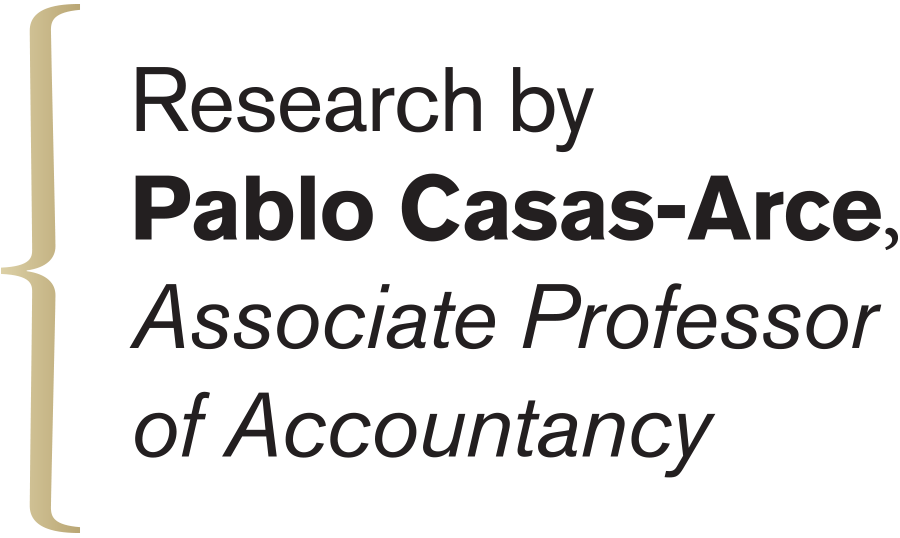
n 2003, shortly after being appointed as CEO of IBM, Sam Palmisano declined a substantial end-of-year performance bonus and insisted that a portion of it instead be shared with managers.
His altruistic actions, says Associate Professor of Accountancy Pablo Casas-Arce, were not surprising — especially for a leader focused on developing a culture of cooperation. Palmisano’s choice supports key postulates of research conducted by Casas-Arce and Asis Martinez-Jerez of Cornell University.
The pair designed a field experiment that set out to understand how, or if, leadership styles influence the success of financial incentive programs within organizations. Over four months, teams of individuals within 177 branches of a medium-sized Latin American bank competed in a series of tournaments, unaware they were part of a research study.
Each branch participated in monthly competitions and at the end of each month, the top three branches received a $2,500 performance prize to be shared among branch members. The contest was structured around the World Cup, with teams scoring “goals” for exceeding commercial sales targets.
magine you’ve been asked to host a dinner party, but you don’t know when or where it will be. You don’t know if you’ll be cooking for five people or 50. No one has told you what’s on the menu or where you can buy food. Oh, and you have no idea what your budget is. Sounds stressful, right?
Now imagine all those unknowns in a life-or-death situation — a massive earthquake or flood — and the situation gets much more serious.
That’s what Mahyar Eftekhar, associate professor of supply chain management, and Scott Webster, professor of supply chain management, address in their paper, “Prepositioning and Local Purchasing for Emergency Operations Under Budget, Demand, and Supply Uncertainty,” published in Manufacturing & Service Operations Management. Co-authored by Jing-Sheng Jeannette Song from Duke University, the research aims to help humanitarian organizations make decisions about their rapid-onset disaster response inventory.
ord-of-mouth (WOM) is a supernova communication tool, with companies often using traditional techniques such as referral and seeding programs to buy customer traction with WOM incentives.
Google pays business customers $15 every time they refer a new account. Other companies send targeted customers, or “seeds,” free products and pay them to write reviews and share information about the item, often through social media to attract more customers.
Yet there can be a downside to giving perks. Even though refer-a-friend incentive programs are popular, they may not work well because individuals might worry about compromising personal friendships. In addition, companies that pay for reviews are perceived as less sincere.
But according to Assistant Professor of Marketing Monika Lisjak, whose paper, “EXPRESS: How Marketing Perks Influence Word of Mouth,” was published in the Journal of Marketing, there’s a way to leverage WOM to motivate consumers to participate so that it doesn’t backfire.
ommercial real estate broker Murphy Cheatham (MRED ’07) remembers in vivid detail the conference he attended years ago at a posh Paradise Valley, Arizona, resort when he was a master’s degree student at W. P. Carey. When he glanced around the room, he came face-to-face with a stark reality about his chosen career.
“I remember looking up and it kind of put me in a weird place,” Cheatham says. “You’d think, ‘There have to be people of color here?’ But the only Black people in the room besides me were the servers.”
That wouldn’t be the last time Cheatham found himself in that situation since he jumped into the white-dominated real estate industry, working on development deals across Arizona, Louisiana, Tennessee, and Texas. An imposing figure at 6 foot, 6 inches, he says he has learned to overcome the subtle yet unmistakable discrimination that still looms large.
1950s
Rosemary Coates (BS Transportation ’79) is the founder and executive director of the Reshoring Institute, a nonprofit organization focusing on the expansion of U.S. manufacturing. She is also the president of Blue Silk Consulting, a supply-chain management consulting firm. Coates recently participated in an event with C-Sweet, a national organization that aims to foster executive-level relationships for women across sectors in business and industry, where she spoke about reshoring, helping the economy, and workforce issues.
Chris Cocalis
(BS Accountancy ’92)
lthough its supply chain was disrupted during the beginning of the pandemic, Pivot Cycles and its president, Chris Cocalis (BS Accountancy ’92), kept business balanced when it began to boom.
Founded by Cocalis in 2007, the company designs and builds high-end performance bicycles, particularly in specialty categories like mountain, downhill, and full suspension. Pivot Cycles has headquarters in Tempe, Arizona, and assembly facilities in Germany and Taiwan.
2020 curbs cycle supply chain
April 2020 proved to be the most difficult month for Pivot Cycles. “We had to look at our sales every day, and run projections of how many days we could keep a full staff on board,” Cocalis says.
One month later, however, it was as if a light switch had been flipped on. With the world stuck at home, people began rediscovering their love for the outdoors. “We had more orders that month than the rest of 2020 so far,” Cocalis says. Thanks to what the media had been referring to as a “bike boom,” it suddenly seemed like Pivot Cycles would be OK.
lthough its supply chain was disrupted during the beginning of the pandemic, Pivot Cycles and its president, Chris Cocalis (BS Accountancy ’92), kept business balanced when it began to boom.
Founded by Cocalis in 2007, the company designs and builds high-end performance bicycles, particularly in specialty categories like mountain, downhill, and full suspension. Pivot Cycles has headquarters in Tempe, Arizona, and assembly facilities in Germany and Taiwan.
2020 curbs cycle supply chain
April 2020 proved to be the most difficult month for Pivot Cycles. “We had to look at our sales every day, and run projections of how many days we could keep a full staff on board,” Cocalis says.
One month later, however, it was as if a light switch had been flipped on. With the world stuck at home, people began rediscovering their love for the outdoors. “We had more orders that month than the rest of 2020 so far,” Cocalis says. Thanks to what the media had been referring to as a “bike boom,” it suddenly seemed like Pivot Cycles would be OK.
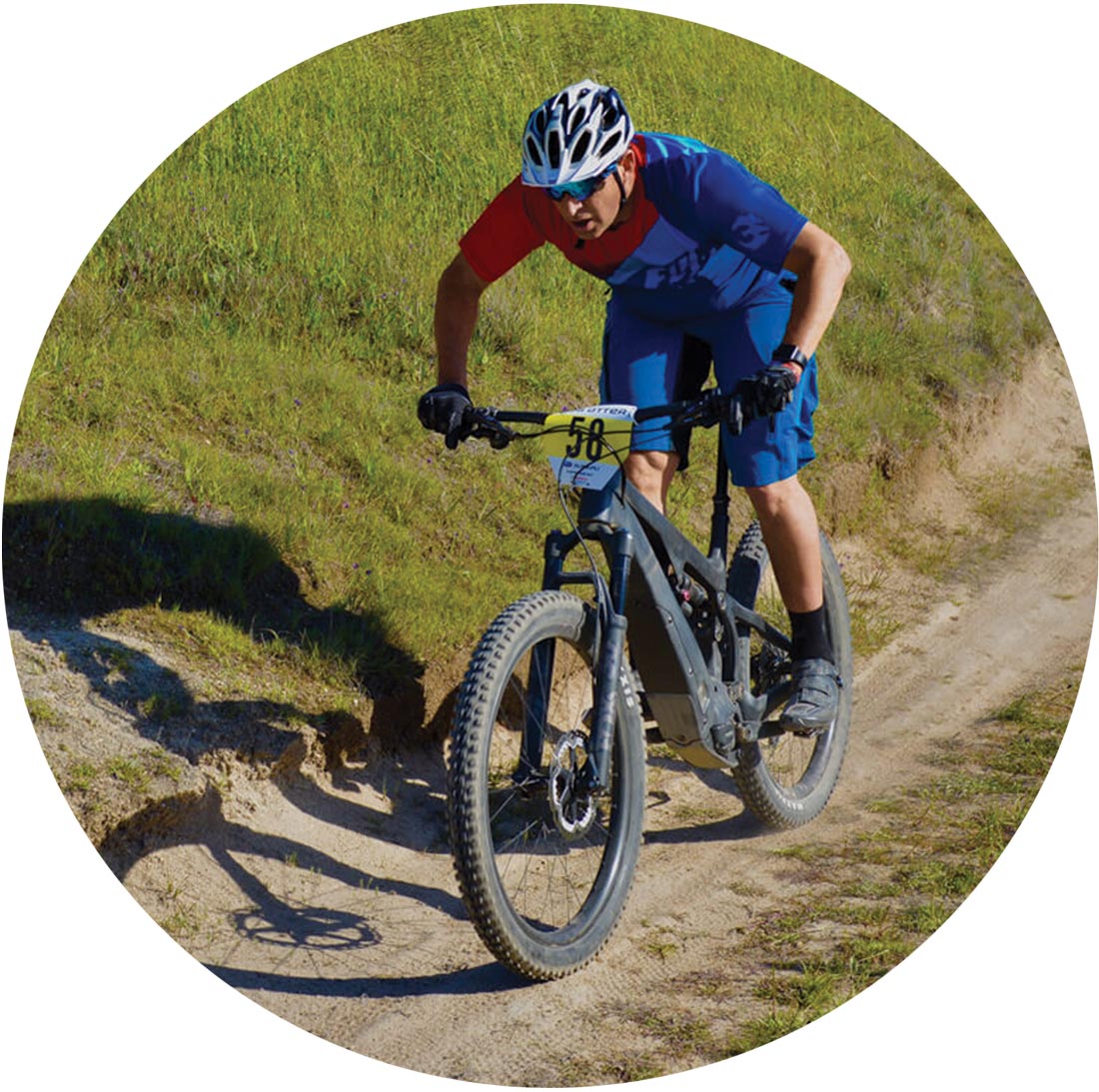
(BS Accountancy ’92)
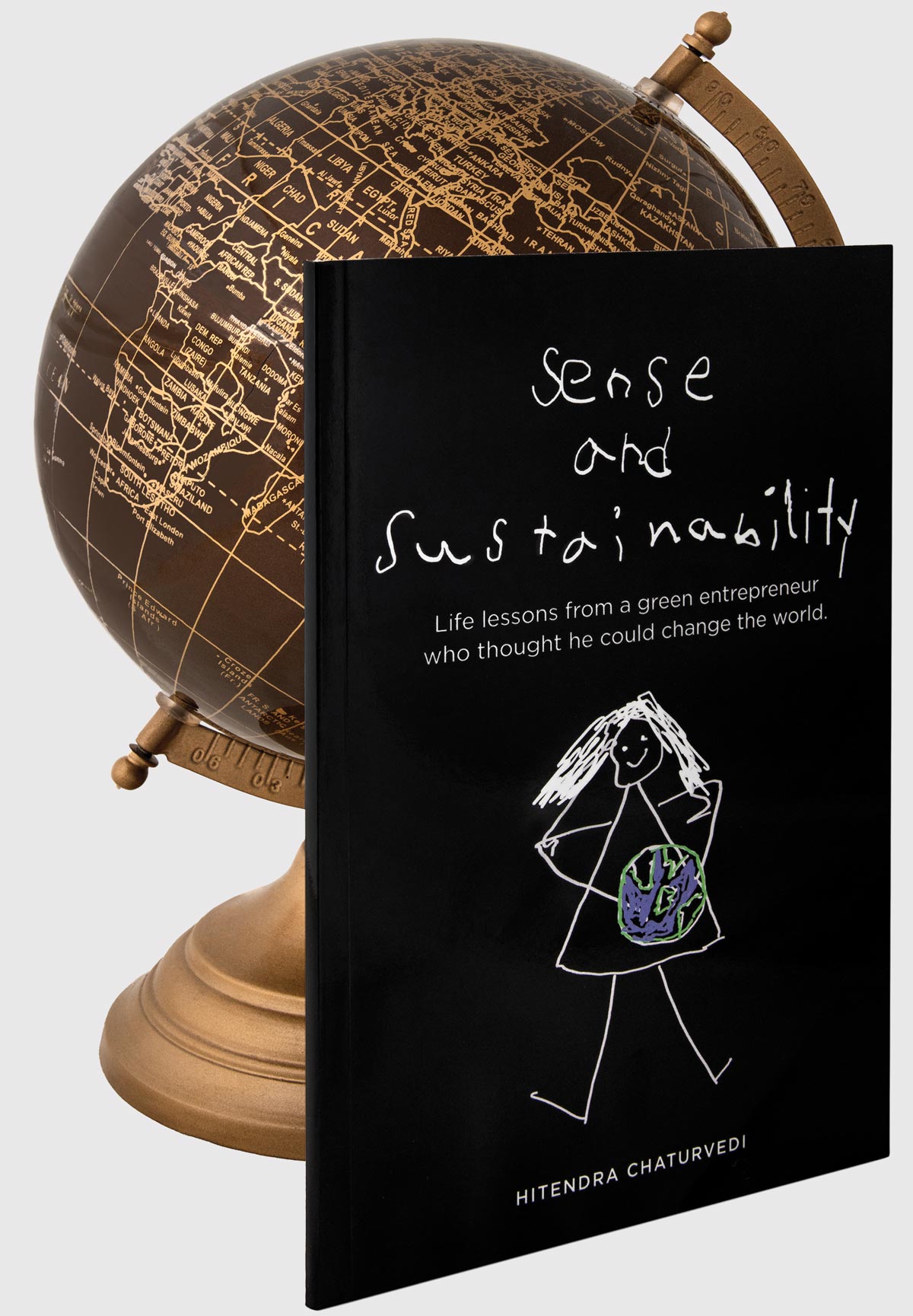
hat can we learn from a green entrepreneur? For starters, you can gain an understanding of the supply chain challenges that developed and developing countries face when trying to tackle sustainability. The book Sense and Sustainability explains several such subjects and solutions, including: How can we understand and counter fake news and myths about sustainability? Who are the sustainability actors sabotaging each other? Can we establish global sustainability standards and education? What are the contrasting roles of technology?
Written by Hitendra Chaturvedi, supply chain management professor of practice, the book brings to life powerful sustainability lessons and a unique perspective on the challenges our environment faces today.
Looking back on growing up in India and then going back as an adult, Chaturvedi recalls what happened to his backyard, which was the Himalayas. “It was ravaged. This is when the wake-up call came,” he says. The mountain streams and rivers Chaturvedi used to drink water from were used as a dumping ground for sewage and trash.
“Many of us don’t realize that much of what we think is going to be recycled ends up in the landfill,” Chaturvedi says.
Business people who want to do the right thing but are confused by complicated models will also find solutions they can understand and implement at work. He describes the five Rs: reduce, repair, resell, reuse, and recycle.
“If we’re going to talk about sustainability, we have to integrate sustainability into everything we do,” Chaturvedi says.
he sixth annual Sun Devil 100 list included 52 W. P. Carey leaders we’re proud to recognize. The Sun Devil 100 honors the top 100 fastest-growing alumni-owned or -led organizations. The Class of 2021 features organizations represented by 133 Arizona State University alumni, ranging from individual business owners to large corporations in more than two dozen industries.
alumni.asu.edu/events/sun-devil-100
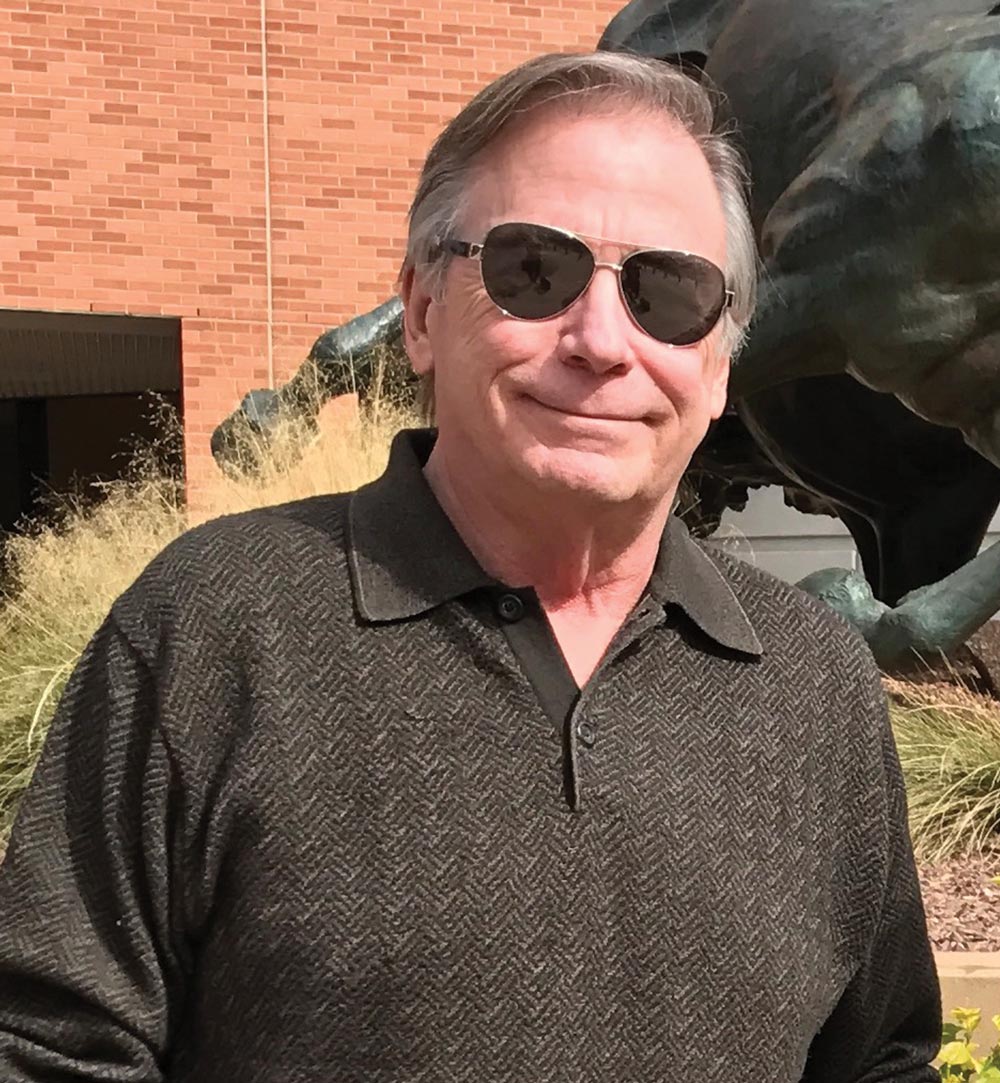
Elkins is perhaps best known for the creation of the volume-weighted average price (VWAP) measure as a trading target while working as head trader at Abel Noser in 1984. The VWAP remains in use today. He joined W. P. Carey in 2015.
Elkins’ Trading in Financial Securities course was typically filled and met with rave reviews. “His greatest joy in retirement was in teaching and mentoring all of his students at W. P. Carey,” says his wife, Doray.
The impact of Elkins’ teaching is apparent from individual student comments in end-of-semester reviews, as well as the numerous emails and phone calls that continued well after a semester ended. He will be remembered for his dedication to students and his passion for financial markets.

Elkins is perhaps best known for the creation of the volume-weighted average price (VWAP) measure as a trading target while working as head trader at Abel Noser in 1984. The VWAP remains in use today. He joined W. P. Carey in 2015.
Elkins’ Trading in Financial Securities course was typically filled and met with rave reviews. “His greatest joy in retirement was in teaching and mentoring all of his students at W. P. Carey,” says his wife, Doray.
The impact of Elkins’ teaching is apparent from individual student comments in end-of-semester reviews, as well as the numerous emails and phone calls that continued well after a semester ended. He will be remembered for his dedication to students and his passion for financial markets.
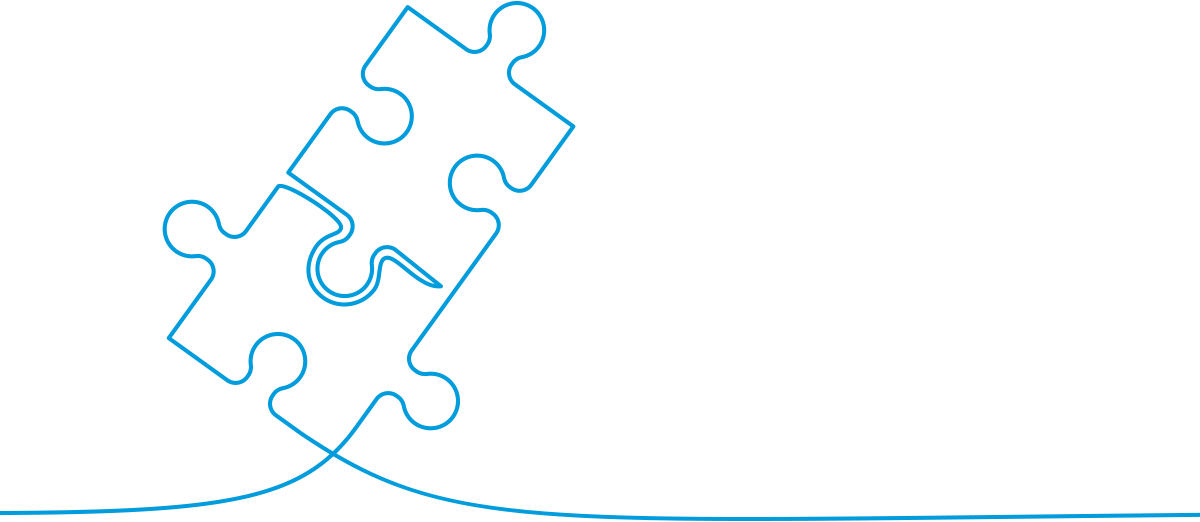

5. ASU fight song (2 words)
6. Human-made canal in Egypt
7. Final customer of the finished product (2 words)
9. The person responsible for modeling data
11. International prizes awarded annually for outstanding work
13. Quantitative tool used to aid decision-making
17. Minimum distance and maximum demand; trip to the dairy (2 words)
18. Supply chain visibility strengthens consumer ______
19. Document acknowledging shipment
20. Detailed coordination of transporting goods
21. The potential for financial gain or loss
25. A need for a particular item
26. A passport for cargo; legal document that provides tax-free customs clearance
27. First products Amazon sold
29. First building on the ASU Tempe campus (2 words)
32. The amount of goods producers are willing to make and sell
42. Goods being transported
43. Logistics accounts for approximately 8% of U.S. ______
44. Bill Carey’s middle name
45. Goodwill, trust, and respect between members of the supply chain (2 words)
3. Meeting the needs of the present without compromising the future
4. Creating favorable supply agreements
8. Building where goods are stored
10. Worldwide
12. W. P. Carey has 100,000+ ______
14. Motivating, influencing, and guiding others
15. ASU was named #1 in ______ six years in a row
16. The act of obtaining goods or services
22. Repairable inventory item
23. W. P. Carey is a place where business is ______
24. Creative partnership
28. ASU mascot since 1946
30. No supply network is immune to ______
31. Summary of intended expenditures
35. Physical or intangible resource
36. Plan for attaining a particular goal
37. A global network of servers; the internet
41. School color


